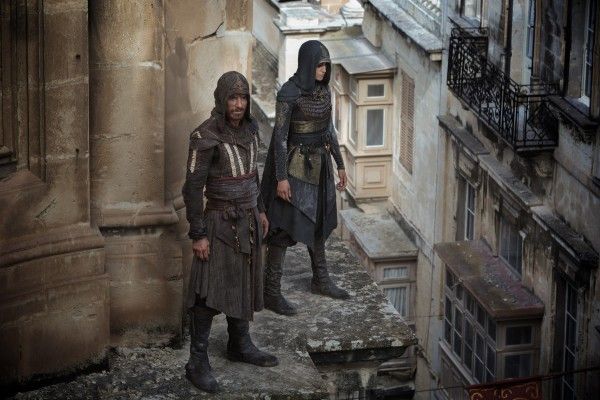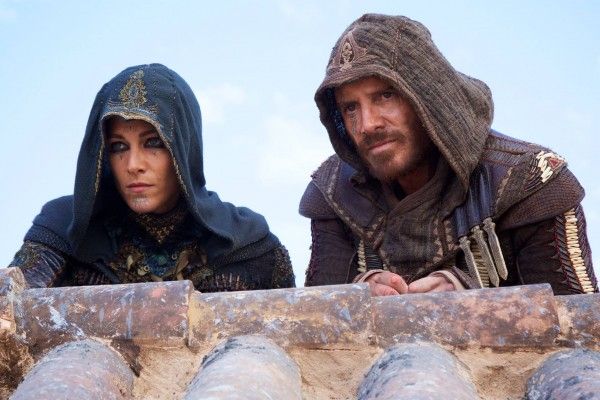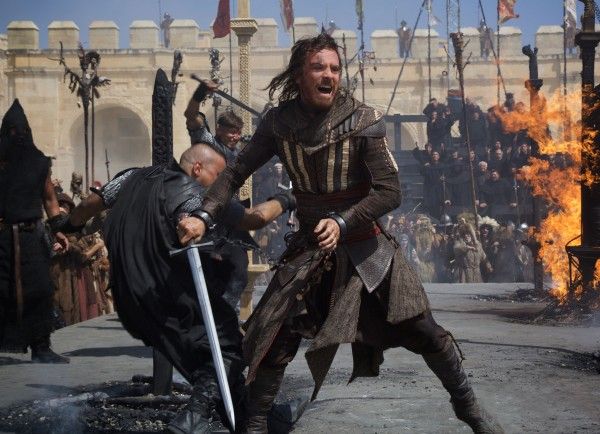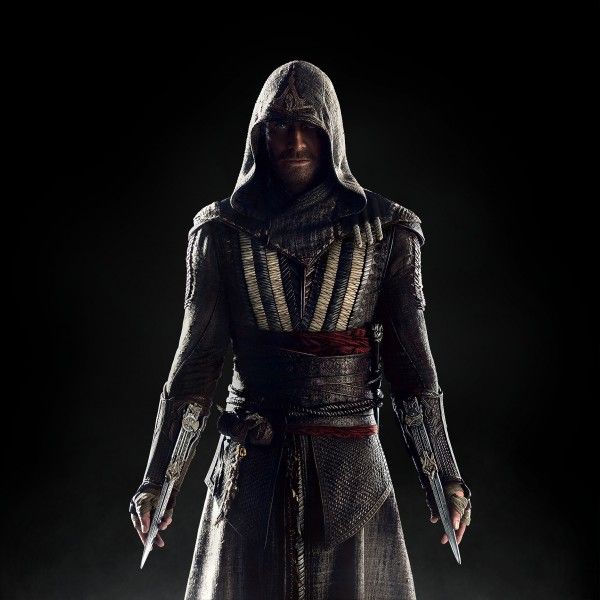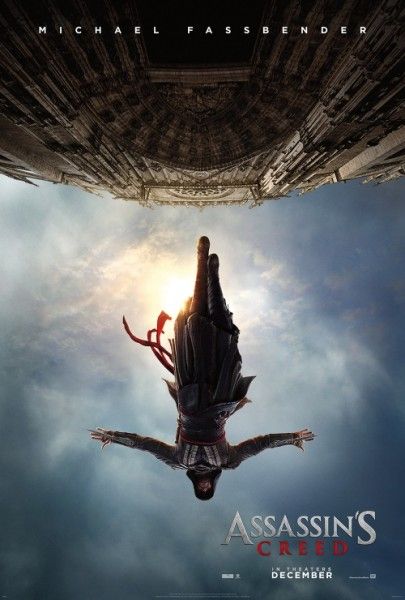When it was announced that Ubisoft was developing a feature film adaptation of Assassin’s Creed, few could imagine just how much clout the project would gain over the course of its development. But indeed, one of the most exciting performers working today not only boarded the project as its star, but also chose to spearhead the film creatively as its producer. Fassbender would subsequently enlist his Macbeth director Justin Kurzel to take the helm, signaling that this wasn’t simply going to be an action franchise play, but would be approaching the material from an artistic point of view. Indeed, Kurzel brought with him renowned cinematographer Adam Arkapaw and filled out the cast with the likes of Marion Cotillard, Jeremy Irons, Michael K. Williams, and Brendan Gleeson.
Last fall, I had the pleasure of visiting the London set of Assassin’s Creed along with a small group of reporters, and we got to speak with Fassbender about his experience on the film as producer and star. The Oscar nominee revealed why Assassin’s Creed attracted him in the first place even though he’s not really a gamer, and also discussed his relationship with Kurzel, the script development, and why they came up with a new design for the Animus. Fassbender also discussed the larger themes of the Assassin’s Creed franchise as a whole, making a strong comparison to another huge franchise: Star Wars.
Fassbender was clearly invested in making this film something more than just the video game come to life, and it was made all the more impressive given that the guy had been flying back and forth to promote Steve Jobs at the time. Based on all my conversations with those involved in the film, it truly does feel like Assassin’s Creed could be one of the very first great video game movies. I think you’ll feel the same after reading what Fassbender has to say.
And for more on the film, peruse more of my set visit coverage and check out the newly released trailer:
- 'Assassin's Creed': 34 Things to Know About the Ambitious Video Game Adaptation
- ‘Assassin’s Creed’ Trailer: Michael Fassbender Runs, Jumps, and Kills in 15th Century Spain
So this is your second time working with Justin Kurzel, and you’ve done that before with Sir Ridley Scott, so I was just wondering is there more of a clear shorthand? Is there less talking with the director?
MICHAEL FASSBENDER: It depends really. There’s been a lot of talk on this because we’ve been developing this for…obviously I’ve been involved with this for four years now, so when Justin came on, which was maybe a year ago, we’ve been talking a lot. As much in the development phase as anything else. But yeah, we enjoy working with one another, we understand one another, and you definitely wouldn’t go back and work with somebody again if it wasn’t a good experience the first time. And a shorthand does develop, yeah.
Because you’ve been involved since day one, what was it about Assassin’s Creed that made you so passionate about this project?
FASSBENDER: I just thought if you’re doing a fantasy film, the first thing about it was to have something that was seeded in some sort of scientific world. What I mean is basically the idea of DNA memory. I just thought that it was a really interesting catch, and I thought that it was a really plausible theory. And I think if you can bring something like that to a fantastical world, it hooks the audience in even more, and makes the journey even more immersive. So I thought that was the first thing, and then I just loved the idea of Templars versus Assassins, this idea of an elite group of people struggling with the idea of free will and these sort of rebels to that elite force trying to struggle for humanity, essentially. And the idea that the original Assassins were Adam and Eve and they picked the apple in the Garden was really interesting.
Also what I liked about it is that it’s a lot like Star Wars; you have the dark side and the light. Both of these factions, they contradict each other all the time, they contradict themselves all the time. They are hypocritical, as well, of their beliefs — and I thought that was cool. So morally, it’s a very gray area that both of them are working in and I thought that was unusual for this sort of type of film, and also a lot more interesting.
It was developing for quite a while. What was the key aspect that made it ready to go?
FASSBENDER: We had a start date. [laughs]
What was the development process like? What were the different iterations? What was the one iteration you found that was ready to go?
FASSBENDER: We’re still working. These sort of films, you’re always working on it. Well, we got Justin, you’re lucky to get him on board. We assembled a cast. The script is something we’ve always been working on, but we got to a place earlier this year where we felt we had a structure and we had something that was simplified. Because as you all know, this is a very dense world, and trying to bring it to a cinematic experience is different. We tried to simplify as best we could and really sort of, you know, get the important aspects of the game across, because there’s a lot for an audience to take on board. So to really find a format where we could get these things across and keep it in a cinematic and dramatic experience, that was really the challenge.
What’s also interesting about this as a blockbuster is that you’re the main character, but you’re playing two characters. Can you talk about, besides time periods, how you’re able to differentiate these two different personas from one another?
FASSBENDER: Well, one doesn’t say a lot and the other does. [laughs] You know, basically in this story, you have somebody who doesn’t realize where he’s coming from. He doesn’t have a lineage he can sort of feel a belonging to. That’s our modern-day protagonist, Cal. He doesn’t realize he’s an Assassin; he’s a bit of a lost soul. He’s always been drifting in and out of correctional facilities. Then, of course, Aguilar is very much somebody that belongs to the Creed. He has a cause, he’s sort of been following that cause. He belongs to it. So they’re the two different standpoints of the character, and hopefully Aguilar will teach Cal, from the regressions, that he does belong to something. That’s the main difference between the two characters.
Based on the script, it sounds fairly close to the first game in the sense that Desmond Miles was out of the Assassins for most of his life, but then Altair was very much embedded. Would you consider this to be part of the same universe or an extension of the same universe, or just an adaptation?
FASSBENDER: You know, it’s all part of the same universe. We really want to respect the game and the elements to it, but we also wanted to come up with our own thing. And one thing I’ve sort of learned from doing the franchises like X-Men is that audiences, I think, want to be surprised and to see new elements of what they already know, and different takes on it. Like I said, we’re really respecting the very core elements of the game, but we wanted to bring something new to it as well, so that’s why we have these new central characters.
One element we’ve heard about that has been changes is that the Animus has been changed to give you more to work with as actors. Can you talk a little bit about that?
FASSBENDER: Well, you know, we didn’t want to have something where you just sit in a seat. Number one, we’ve seen it before in The Matrix, and it’s also just not a very dramatic experience when we’re doing the modern-day version of the regression. We wanted to have the characters more physically involved in it. And so I think Justin and [production designer Andy Nicholson] have come up with something really interesting for the Animus. Talking to Ubisoft, I think, perhaps, they’re thinking of adopting some of these ideas. But to not have it just be Cal a passenger in a chair basically, we wanted to have something more interactive for that character in the present day stuff.
In your life, have you ever been a gamer?
FASSBENDER: A little bit, but when I start playing video games I tend to find myself at 8:30 in the morning, still playing. You have to pry the joystick from my hand.
What’s your favorite? If you had to say, “My favorite gaming experience is…"
FASSBENDER: I always liked racing games. I would sort of sit there and try to perfect the track or get the fastest I could around the track, trying to get the times down. But since obviously joining this [project], I’ve started to play the games, and it’s amazing to see how things have come along since I was last playing. [laughs] It’s extraordinary, I mean, the detail. And I know a lot of gamers are sort of fanatical about this stuff, the detail. And the great educational benefits of it, the history elements. I was talking to a friend of mine and he said to his son, who is maybe fifteen or sixteen, “Let’s go away on a trip together,” and his son picked Florence because he played it in the game, and he wanted to see if all the elements of the city were as they were in the game. So that’s been a real education for me, sitting down and playing the Assassin’s game and seeing a 360-degree view of a city from another time period. It’s pretty exceptional.
Looking at Justin’s work, he’s clearly a director with a singular vision. I was just wondering if when the movie comes out, it will feel like Justin’s Assassin’s Creed
FASSBENDER: I think it’ll be a collection of all of us contributing. I mean as you can see what the set design team has done. I think he’s got a strong vision, but he’s also very much a team player and will incorporate all elements of the film group, all the departments together and putting it together. What I like about Justin is that he’s strong. He is a visionary, but he also incorporates other people’s ideas and other departments.
This is obviously a very physical role; we’ve heard about some of the free-running and some of the fight sequences. What’s been the most exciting part of the training process for you or the most challenging part?
FASSBENDER: Uh, not having enough of it? [laughs] You know, it’s just trying to get those action scenes and play them out in wide as much as we can, in one run-through. We’re not using a lot of green screen, so we’re doing a lot of actual location shooting. We were out in Malta there a month ago. You know, stunt guys falling of real buildings, off real heights — without a lot of green screen. It’s a bit old school like that, and that is very much Justin’s vision. It’s exciting to see it done that way because nowadays you don’t get that anymore. It’s usually done in the studio with a green screen.
Yeah, just looking at this set, the way it all flows together, I imagine that has to help the process as well.
FASSBENDER: Yeah, I mean this helps for sure in terms of that element. But in terms of those action beats, you just don’t get that — people jumping from one building across to another building, falling off like a 30-meter drop into an old town part of Valletta in Malta. That’s pretty special.
What’s your experience been working with Ubisoft? Because I know it’s almost unprecedented for a video game company to get this involved in an adaptation of their games, and you’ve had people from Ubisoft on set as well. So what’s it been like working with them?
FASSBENDER: I think they just want to protect their franchise and protect the wonderful fan base that they’ve built up through their games. So I think they’ve had experience before with films being made out their video games and maybe didn’t get the results they liked, so they’ve been more hands on here, which has been great. Thanks to them, I was introduced to this world. Like I said, I didn’t really know much about it.
You seem sort of fearless because you go from a period drama to a comic book movie to Shakespeare, and you know this is fantasy based on a video game. Is there anything that does scare you?
FASSBENDER: Trust me, all of them scare me. [laughs] I just feel like that while I’m given this opportunity, I may as well try as much as I can, learn as much as I can. Trust me, there’s healthy doses of fear there.
Are you scared right now?
FASSBENDER: Right now? At this point in time? When you say it to me like that? Yes. [laughs]


